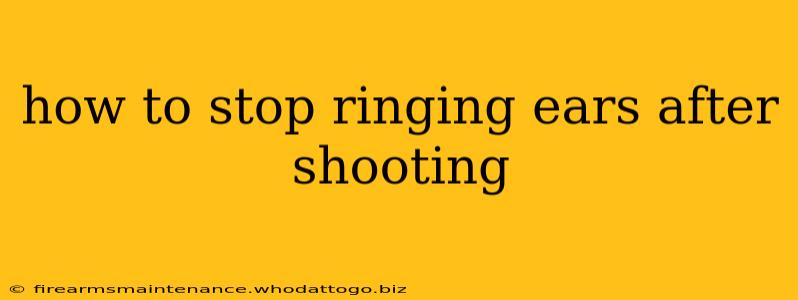Shooting, whether for sport, hunting, or self-defense, can expose you to dangerous levels of noise. The resulting temporary or even permanent ringing in the ears, known as tinnitus, is a serious concern that demands immediate attention and preventative measures. This comprehensive guide will explore how to manage and minimize tinnitus after shooting, emphasizing both immediate actions and long-term hearing protection strategies.
Immediate Actions After Exposure to Gunfire
The first few hours after exposure to loud gunshots are crucial in mitigating the effects on your hearing. Acting swiftly can significantly reduce the severity and duration of tinnitus.
1. Get Away from the Noise:
The most immediate step is to move away from the source of the loud noise. Continued exposure only worsens the damage.
2. Assess Your Hearing:
Quietly assess your hearing. Do you experience any ringing, muffled sounds, or pain? Note any changes in your hearing ability.
3. Rest and Hydration:
Your body needs time to recover. Rest and stay hydrated to help your system process the effects of noise exposure.
4. Avoid Further Noise Exposure:
Give your ears a break. Avoid loud environments, including concerts, clubs, and even loud conversations for at least the next 24 hours.
5. Over-the-Counter Pain Relief:
Over-the-counter pain relievers like ibuprofen can help manage any discomfort or pain associated with noise-induced hearing loss.
Long-Term Strategies for Preventing Ringing Ears
Preventing tinnitus is far more effective than treating it. Adopting these habits will significantly reduce your risk:
1. Consistent Use of Hearing Protection:
This is paramount. Always wear hearing protection rated for firearms. This includes:
- Hearing Protection Ratings: Understand NRR (Noise Reduction Rating) and choose earmuffs or earplugs with high NRR ratings specifically designed for firearm use. Higher isn't always better; prioritize a comfortable fit for consistent use.
- Types of Hearing Protection: Explore different options like electronic earmuffs (allowing communication while attenuating harmful noises) and custom-fit earplugs for optimal comfort and noise reduction.
- Proper Fit: Ensure your hearing protection fits snugly and correctly to maximize effectiveness. Improperly fitted protection is ineffective.
2. Regular Hearing Check-ups:
Schedule annual hearing exams, especially if you frequently shoot. Early detection of hearing loss allows for timely intervention and management.
3. Understanding Noise Levels:
Become familiar with safe noise exposure limits. The louder the gun and the closer you are, the greater the risk.
4. Distance from the Firing Line:
Maintain a safe distance from the firing line, even when wearing hearing protection. Distance contributes significantly to reducing noise exposure.
5. Environmental Considerations:
Shooting outdoors generally reduces the risk of reverberating sound compared to indoor ranges. Be mindful of your surroundings.
When to Seek Professional Medical Attention
While some ringing may subside naturally, persistent or severe tinnitus warrants immediate medical attention. Consult an audiologist or ENT specialist if you experience:
- Persistent Ringing: Tinnitus that lasts for more than a few days.
- Hearing Loss: Difficulty hearing conversations or noticing sounds you previously could hear.
- Pain or Discomfort: Severe pain or pressure in your ears.
- Dizziness or Vertigo: These symptoms can be associated with inner ear damage.
Protecting your hearing is a lifelong commitment. By combining immediate action after shooting with consistent preventative measures, you can significantly minimize the risk of tinnitus and preserve your hearing for years to come. Remember, your hearing is invaluable – protect it.

